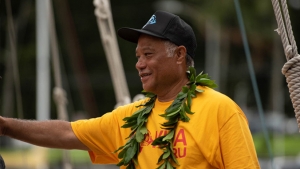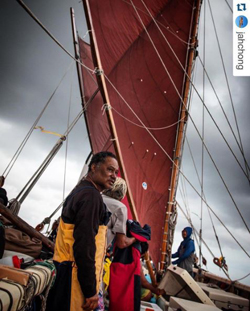The University of Hawaiʻi community is mourning the loss of highly respected, deep-sea voyaging canoe Hōkūleʻa captain Chad Kālepa Baybayan, who served as a navigator-in-residence at the ʻImiloa Astronomy Center of Hawaiʻi.
On April 9, loved ones shared that 64-year-old Baybayan, a UH Hilo alumnus, died. They released a brief public statement:

“Mahalo nui loa to all of our ʻohana, immediate and extended, for your comforting thoughts of aloha, pule and support from places near and far. Thank you also for allowing us this time and space to deal with the passing of our beloved husband, father, grandfather, son, brother, cousin, uncle and friend to so many. Me ke aloha nui nō.”
Baybayan, a Pwo navigator, was one of the original Hōkūleʻa crew members. He took part in the three-year Mālama Honua Worldwide Voyage, a 42,000 nautical mile journey which consisted of 150 ports in more than 20 countries. The headline-grabbing expedition earned Baybayan and the Hōkūleʻa crew a National Geographic 2017 Adventurers of the Year nomination.
“Kālepa dedicated his life to perpetuate the voyaging wisdom of his ancestors,” said UH President David Lassner who sailed with Baybayan on Hōkūleʻa. “I feel fortunate and honored to have been part of the crew for some of his journeys in recent years and to have been able to learn from him. Kālepa’s passing leaves a deep hole within the University and is an immense loss for all of Hawaiʻi.”

The Maui native also served as captain on voyaging canoes Hawaiʻiloa and Hōkūalakaʻi. Baybayan brought his ʻike (knowledge) of traditional Polynesian voyaging to ʻImiloa and developed wayfinding activities, curriculum and educational criteria, and coordinated outreach programs and projects. A champion of astronomy, the cherished waterman worked to fulfill ʻImiloa’s mission to merge science and discovery with Hawaiian culture.
“We were honored to know, and work alongside him here at ʻImiloa in his education and outreach endeavors as our navigator-in-residence,” said ʻImiloa Executive Director Kaʻiu Kimura. “But even more than that, we were blessed to have him as a friend and member of our ʻohana ʻImiloa. The impact of his life’s work is evidenced in so many ways all throughout the community and while he will be sorely missed, we are committed to continuing his work of educating future generations about the wealth and applicability of our ancestral knowledge of wayfinding to ongoing pursuit of new knowledge to the benefit of our community and our Hawaiʻi.”
In summer 2020, Baybayan co-published a UH study on the severe lack of documentation of Indigenous voyaging data. He found publications on non-instrument wayfinding and voyaging of Pacific Islanders were often ignored in widely used indexes such as the Dewey Decimal Classification in libraries, the Library of Congress and the Web of Science citation database. Baybayan advocated for a more complete database system to benefit those conducting research in traditional wayfinding and voyaging arts.
“Draw your own map, become the map maker…the cartographer for your own life,”
—Chad Kālepa Baybayan
In 2017, after wrapping up Hōkūleʻa’s historical three-year journey, he was selected to deliver the keynote address at UH Hilo’s fall commencement. Baybayan urged the graduates not to be observers, to get into the race and paddle and be like the oceanic mariners who sailed into the Pacific and discovered the stars.
During the address he noted, “Draw a big circle around where you want to end up and then throw the map away. Draw your own map, become the map maker…the cartographer for your own life. Don’t let anyone tell you what you should be. Donʻt let others define you. Be responsible for owning your own dream and vision of where you want to arrive at. Be persistent and relentless and working that sail plan so that you arrive at your destination.”
UH Hilo Chancellor Bonnie Irwin added “Kālepa personified the finest attributes of a UH Hilo alumnus and staff member, paying forward his education to inspire generations to seek out knowledge and preserve ancestral ways.”
Baybayan’s work through the Polynesian Voyaging Society and UH has helped shape a new generation of navigators, educators, scientists and community stewards.


